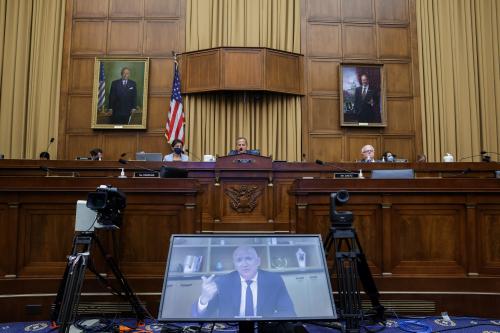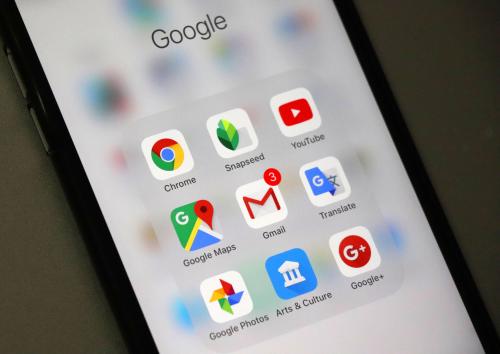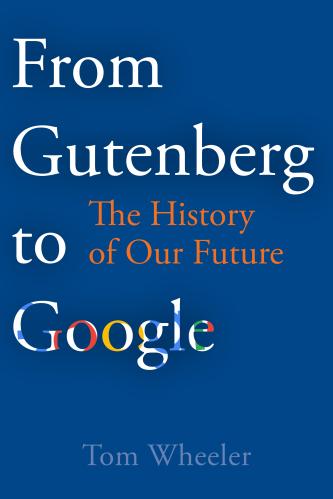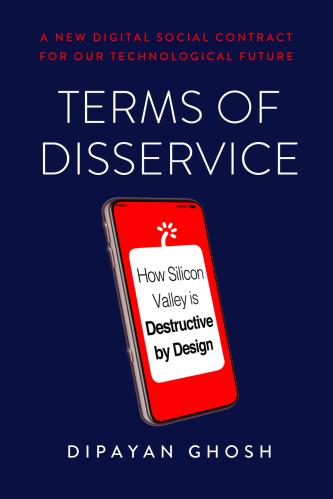The last 30 years in the United States have been marked by what has been called the era of “permissionless innovation”. Many of the decisions about what to innovate, when to innovate, and how to bring digital products and services to the marketplace have been left to tech companies. They decided what products were needed, how they were deployed, and who could purchase them.
With the release of the long-awaited House Antitrust Subcommittee report, there are growing signs that era is coming to an end. As Brookings President John Allen and I argue in our book, “Turning Point: Policymaking in the Era of Artificial Intelligence”, a combination of forces is moving the country towards what likely is to be greater public engagement, oversight, and regulation.
The House report is a clear sign of how Democratic legislators have shifted in their policy prescriptions. In that document, the committee members take a hard line on market competition, antitrust issues, and the regulations and policies needed to address those problems. They argue that large tech firms represent “the kinds of monopolies we last saw in the era of oil barons and railroad tycoons.”
In areas ranging from e-commerce and search to social media and mobile apps, the committee claims these firms engage in predatory practices and anti-competitive behavior that harm small and medium-sized businesses and hurts consumers. As Congressman David Cicilline noted in a September Brookings TankTank podcast, even though many of the products offered to the public are free and voluntary, they hurt users and therefore no longer warrant the tax, regulatory, and policy benefits that were commonplace in previous decades.
To address these abuses, legislators recommended a range of policy remedies. They want to beef up staffing and budgets of major enforcement agencies such as the Federal Trade Commission, the Federal Communications Commission, and the Department of Justice. They want stronger reviews of mergers and acquisitions, the end of digital practices that advantage their own products over those of competitors, the end of winner-take-all economies, greater protections for news publishers, and reductions in fees charged to app developers.
But more ominously for the tech sector, the report calls for new policies that separate business functions. It argues companies can’t sell products while also setting the rules of the marketplace and proposes new rules that will prohibit that setup. Large tech platforms can set the rules of the marketplace or sell digital products and services, but not do both. According to legislators, allowing companies to engage in both activities leads to unfair practices and consumer harms. What is needed, according to the report authors is a Glass-Steagall Act for the internet to stop unfair competition.
While Democrats were generally in agreement with the committee recommendations, Republicans disputed the regulatory changes. Representative Ken Buck released his own report and said he agreed with 330 of the 449 pages in the document. He noted there were serious marketplace abuses and predatory practices, and he and several fellow Republicans agreed there needed to be additional enforcement resources, a reform of the “burden of proof” legal standard, and greater data portability so consumers could take their online data to other companies. But GOP members stopped short of endorsing many of the expanded regulations and explicitly rejected a Glass-Steagall Act for the internet.
How Democrats and Republicans negotiate their differences will determine how quickly the old era ends and the new one begins. If there is a Democratic president, House, and Senate in 2021, party disagreements will not stop the regulatory train speeding down the tracks. If Republicans hold the Senate or moderate Democrats amend the regulatory proposals, however, there will be significant change but at a much slower pace.
In the United States, we are used to arguing that policy is far behind the technology and many believe that always will be the case. Yet as Tom Wheeler argues in his insightful Brookings Press book, “From Gutenberg to Google”, the history of technology innovation is marked by innovation, negative byproducts, and policy that catches up fast when political circumstances change. We now are on the cusp of a new era of tech policy, one in which the policy catches up with the technology. Historians will define 2021 as the year things changed and the House report will be viewed as a landmark study that defined the new era.
The Brookings Institution is committed to quality, independence, and impact.
We are supported by a diverse array of funders. In line with our values and policies, each Brookings publication represents the sole views of its author(s).









Commentary
The end of permissionless innovation
October 7, 2020